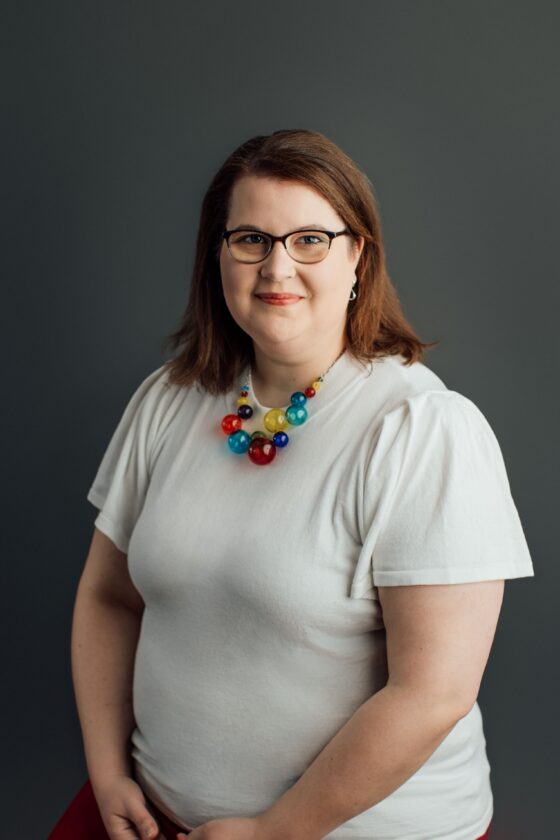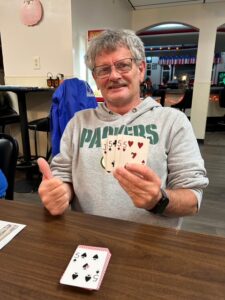Narrative medicine — the art of listening to patients
- A patient speaks to a medical professional in this stock photo provided by OSF. One of OSF HealthCare’s physicians has a master’s in narrative medicine, a program that helps doctors better communicate with patients.
- Dr. Amanda Bruemmer recently spoke to OSF HealthCare’s Paul Arco about about connecting with patients through empathetic conversation with understanding. (Courtesy photo)

A patient speaks to a medical professional in this stock photo provided by OSF. One of OSF HealthCare's physicians has a master's in narrative medicine, a program that helps doctors better communicate with patients.
When it comes to providing exceptional care, health care providers are constantly looking for ways to better connect with their patients.
That was a lesson Dr. Amanda Bruemmer learned early in her career.
Bruemmer was an English major in college who loved creative writing. But she knew she wanted to go to medical school, so she dove into chemistry, physics and biology courses as she earned her bachelor of science in microbiology and English from the University of Michigan. That’s when a friend told her about a narrative medicine master’s program at Columbia University in New York.
“Narrative medicine is learning about stories, how we tell stories, why we tell stories, how we listen to stories, and then using that information in a clinical setting when you’re taking care of patients to provide more personalized and more comprehensive care,” said Bruemmer, an OSF HealthCare physician who is dual certified in internal medicine and pediatrics.
The term “narrative medicine” was coined in 2000 by Dr. Rita Charon, who literally wrote the book on narrative medicine and is the executive director of Columbia’s program in narrative medicine. In many interviews, Charon said the impetus for starting this program was “a need for providers to look at their processes to see and appreciate what patients are telling us. For me, it became a way for patients to feel heard and noticed.”

Dr. Amanda Bruemmer recently spoke to OSF HealthCare's Paul Arco about about connecting with patients through empathetic conversation with understanding. (Courtesy photo)
In 2012, Bruemmer earned a master’s degree in narrative medicine from Columbia. Among the program’s topics are memoir writing and visual arts. She said the training has helped her become a more empathetic physician when treating patients.
“A lot of my job in narrative medicine is just not to talk,” Bruemmer said. “It’s just to listen, listen to how they’re talking about how they’re feeling, how they’re talking about their illness, how they’re talking about their experiences. And once I’ve heard that, I can help them figure out where they want to go next.”
The greatest benefit of narrative medicine is to the patients, even though they may not know or understand the concept. Bruemmer cites an example of patients who’ve experienced a heart attack. These patients may have the same diagnosis, but the way they handle the news can be vastly different. That’s where narrative medicine can help.
“I think that even after our first meeting, they get the sense that something is different about the way that I talk to my patients, the way that I explain things and the way that I present treatment options,” Bruemmer said. “I think it gives them that space to feel like I understand who they are, what they want and where they’re going. That’s all the components of narrative medicine.”
Bruemmer said her top priority is to understand what each patient wants from their care. She added that she can discuss science, data and medical tests when treating an illness, but it’s imperative to know the patient and how they view themselves and their health.
“I think there’s a lot of disconnect,” she said. “Sometimes patients feel like they’re getting a one-size-fits-all treatment. And I never want anybody to feel that way, because it’s really hard to engage in any kind of a treatment plan, if you don’t really understand why we’re doing what we’re doing.”
Many medical schools have followed Columbia’s lead by offering a variety of courses and seminars on the subject. Bruemmer said many physicians she knows are interested in learning more about narrative medicine. In the long run, she said, it will help each provider build a more well-rounded practice.
As for the future, Bruemmer said narrative medicine will play a significant role in how people interact with their providers. Sure, technology will continue to make headlines as it evolves and shape medicine. But meeting basic expectations – such as listening to patients and learning of their stories – will always be at the forefront of good patient care, she said.
“When we really think about sitting down the patient and the doctor and that relationship, something like narrative medicine is just not replaceable,” Bruemmer said. “It’s something that I think a lot of people feel have been missing for a long time. So, it’s nice to kind of welcome that back into the practice of medicine.”






